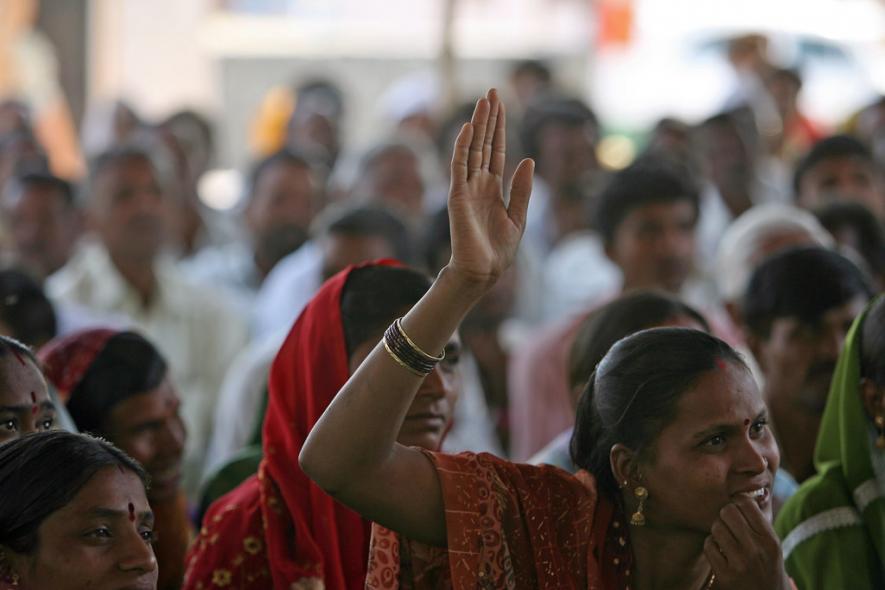
‘The Communists and the Congress are going against our thousands of years of culture and civilisation’, thus spake Prime Minister Narendra Modi. It’s rather odd to club the Communists and the Congress, but perhaps to Modi, who is desperate to get a handle on the next elections, the anachronism does not even occur. Let that rest for a while gentle reader, but let me ask you if the Supreme Court of India, in a majority judgement, mandates the right of women to enter the Sabarimala Temple, who is the Prime Minister or the Sangh Parivar to stop them from doing so?
As a woman, it is demeaning and denigrating to be told in free India that women of menstruating age can’t enter a temple. When two women, Kanakadurga and Bindu, actually made a life-threatening and courageous attempt to get into the temple – braving bare-chested men who are banging at drums and swearing that this is a bastion for men and men only – they deserve a medal, for they did what millions of women are aspiring to do – break into all male bastions.
However, let us take a step back and examine what happened at the height of the freedom struggle against the British Raj. Gandhi kept thinking and in a flash he got it; it was salt that would be the symbol against the Raj. But as Abbas Tyabji and he planned the march, women were excluded, as violence was expected and they thought it would not be chivalrous to expose women to it.
I met Veerbalaben Nagarwadia, who was present during the night-long prayers and hymns that were sung at Sabarmati Ashram. She said, “We were all crying as Gandhiji had said he would not return to Sabarmati until Swaraj was achieved”. I asked her how far she walked, and she said, “I walked until Ellisbridge”, which is just a short distance away from the Sabarmati Ashram.
It was the feisty Kamladevi Chattopadhyay who came to Ahmedabad demanding that women should not be left out of this historic Salt Satyagraha. Gandhi and the 79 marchers had already left for the Dandi March, but she found him in a village and told him that the women of India were ready.
Kamladevi then led 500 women down the beach of Chowpatty in Marine Drive, Bombay, and also fell on the hot coals of the stove as the police tried to arrest her. She later wrote in her autobiography, “The salt satyagraha must stand out as a unique and an incredible form of revolution in human history. The very simplicity of this weapon was as appealing as it was intriguing. As far as women were concerned it was ideally tailor-made for them, as women naturally preside over culinary operations and salt is an intimate and indispensable ingredient.”
The resulting Salt Satyagraha was carried out by many women, who made salt by the sea. Cultural doyen, Kapila Vatsayayan (90) was a child on her mother’s back as she strode to the Bombay beach, making salt. It is that moment that needs to be resurrected and was, when the 45-lakh women’s wall was mobilised in Kerala recently.
Let women be conscientised and vote for those who support their rights, their entry everywhere, not only in temples, but at workplaces, in factories and in fields. And we need a symbol, something commonplace that we can show, and frankly, I think the red menstrual rag is a befitting symbol to wave in the face of patriarchy and authoritarianism.
Recently, I was recording Trilochan Singh (91), who was externed from Lahore for making speeches and jailed in Peshawar. When the Congress Working Committee passed the resolution for Partition, Khan Abdul Gaffar Khan, popularly known as Badshah Khan, walked out. Trilochan Singh says he accompanied Badshah Khan to Delhi for his meeting with Gandhiji, where he said: “You are throwing us to the wolves.”
We all know that the bloodbath of Partition was a terrible mistake. Today, Trilochan Singh says he “fears for the minorities”. Is this the India we want, fiercely male and supremely Hindu? For the first time in history, the religion of Hinduism which has always been supremely tolerant, has taken on a hard, fundamentalist face.
Women toil tirelessly, giving birth, raising children, looking after the old and working in the fields and at jobs to raise a family, with the brunt of our work not being counted in the GDP (gross domestic product). To make speeches that instigate Kanakdurga to be beaten by her mother-in-law, disowned by her husband and brother and kept away from her children, is to be a namak haram – a betrayer of salt. Let us be true to our salt and stand by Kanakadurga and vote for those who stand for women’s rights.




